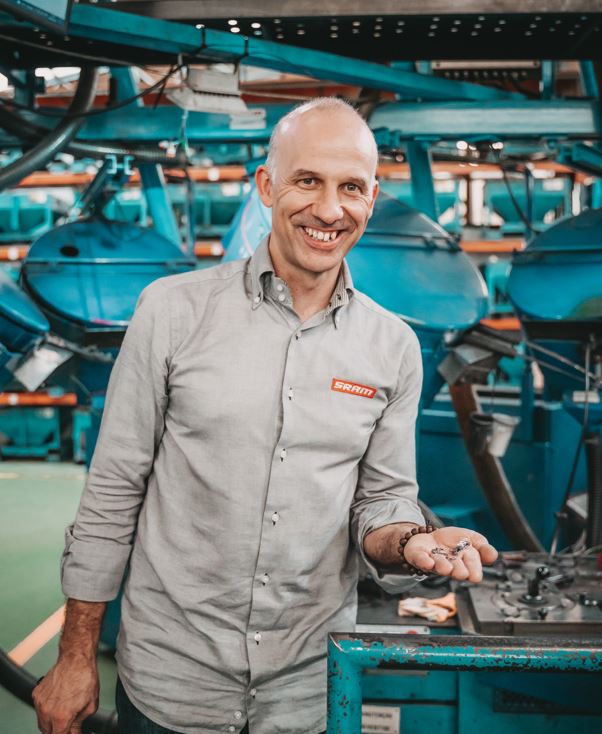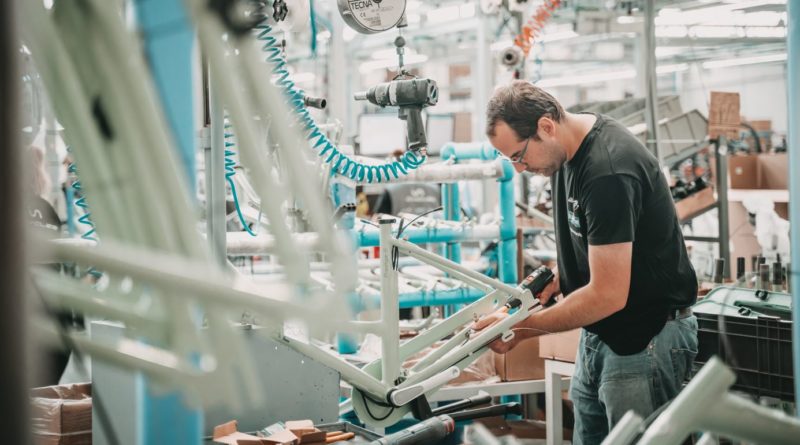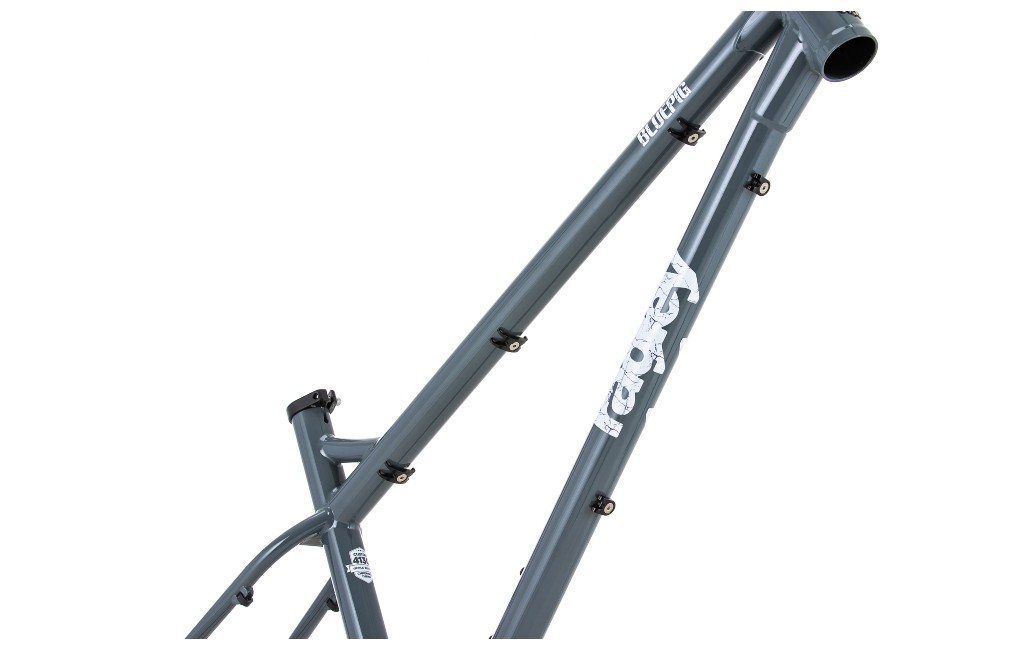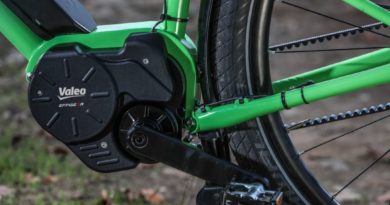How collaboration made Portugal Europe’s largest bike maker
No country in Europe produces more bicycles than Portugal. But why is the bike industry so strong here? A search for clues on-site leads to the region of Águeda – better known as Portugal’s bike valley.
Text & photos: Werner Müller-Schell
Every move is precise to the millimetre, so perfectly rehearsed that even complex tasks are completed in the shortest possible time. If you follow the journey of a bicycle frame along one of the production lines in the new factory of InCycles in Águeda, Portugal, it only takes a few minutes for a complete eBike to roll off the assembly line. Around 20 employees are working on one production line, each making sure that all the components are in the right place: the drivetrain, the brake cables, the wheels, the tyres.
“If we add up the output of all the production lines, we manufacture several hundred bicycles a day,” Filipe Mota says proudly. Mota works as an export manager for InCycles and leads us through the light-flooded plant, which was opened only two years ago and is bustling with activity. At another station, wheels are automatically spoked in a machine, and at a workstation a few metres further, an employee sticks labels on freshly painted frames. Everything looks new—and yet the factory, which has only just been set up, already seems too small in some parts.
“It’s true, things are going very well for us at the moment,” says Mota, “which is why we are already expanding our space again. There is no other way we can handle the amount of orders,” he adds. The sound of screwdriving machines unmistakably fills the huge hall in the background, there is a smell of processed metal and fresh rubber. InCycles’ order books for 2023, Mota emphasises, are already completely filled.
The demand for bicycles has skyrocketed worldwide in recent years. However, examples like InCycles’ show that it has literally exploded in Portuguese bicycle factories. Therefore, it comes as no surprise that this state in the westernmost part of the Iberian Peninsula now occupies the top position of an entire continent. According to the latest data from Eurostat, Portugal is the largest bicycle manufacturer in Europe with a total production of 2.6 million bicycles in 2020—ahead of former market leaders like Italy and Germany. For comparison: up to 20 years ago, just 400,000 bikes had been produced here. Today, the country, which accounts for only two per cent of the EU population, is responsible for one-fifth of all bicycles produced in Europe.
“This development is certainly the result of various factors, such as the European Union’s anti-dumping measures and global developments like the current supply chain issues. But above all, it is the continuous investments which have been made here by the local companies,” says Filipe Mota. He has been working in the Portuguese bicycle industry for 22 years—and has therefore experienced Portugal’s rise to becoming Europe’s number-one bicycle manufacturing country first hand.
A location with a long tradition
The Portuguese bicycle industry has taken a long time to reach the top, a way that coincidentally began exactly 100 years ago. In 1922, the country’s first bicycle factory, the “Fábrica Nacional de Bicicletas”, was opened in Porto. It was the beginning of a success story. There were already many skilled workers based in the region. Águeda especially, located about 80 kilometres south of Porto, was considered a centre for metalworking, and it didn’t take long until more and more companies began to specialise in the production of bicycles and bicycle components.
After World War II, the “Bike Valley”, as the region around Águeda was soon called, also became interesting for international companies. In particular, British brands appreciated the available know-how and the favourable production conditions they found here. “That went well until the eighties. But then many companies migrated to Asia to save costs, and many of our factories got into trouble,” Gil Nadais says. He is the General Secretary of Abimota (Associacao Nacional das Industrias de Duas Rodas), the Portuguese two-wheel association. We meet him at the Abimota headquarters, just a ten-minute drive from the InCycles factory.
Nadais guides us through the multi-storey building, which contains, among other things, numerous testing facilities for a wide variety of bicycle products. Most local bicycle producers have their own quality controls, but they still use the Abimota facilities extensively to have their products tested according to European standards. Today there are about 60 companies in the region around Águeda that can be classified as belonging to the bicycle industry. About 8,000 people are employed by them—or about 25,000, if you also count the local supplier companies.
Portugal is particularly strong in the production of components, Nadais reports, but there are also accomplished bicycle manufacturers. “In the 2000s—especially after the financial crisis in 2008—the negative trend reversed again,” he says. Like InCycles expert Filipe Mota, he points to the anti-dumping measures of the European Union as well as the greater focus of Portuguese companies on the production of high-quality parts since the 2000s. “Many international manufacturers subsequently recognised the potential of Portugal. After all, the local companies here in the region have plenty of know-how because of our long history,” he adds.
 One of these local companies is Rodi. About 20 minutes northwest of Abimota’s headquarters, right in the southern part of Águeda, around 400 employees make wheels and rims—and sinks. “This is a result of our now 70-year-long history,” sales manager Duarte Bernardo tells us as he leads us through the 60,000-square-metre factory. “The machines for making kitchen sinks and wheels used to be similar, so we started producing wheels and rims in the seventies,” he says. Today, four million rims and about 400,000 wheels come off the production lines every year, mainly made of aluminium. Most of the production is done by hand, but in the recent past, there has also been a lot of investment in automated equipment.
One of these local companies is Rodi. About 20 minutes northwest of Abimota’s headquarters, right in the southern part of Águeda, around 400 employees make wheels and rims—and sinks. “This is a result of our now 70-year-long history,” sales manager Duarte Bernardo tells us as he leads us through the 60,000-square-metre factory. “The machines for making kitchen sinks and wheels used to be similar, so we started producing wheels and rims in the seventies,” he says. Today, four million rims and about 400,000 wheels come off the production lines every year, mainly made of aluminium. Most of the production is done by hand, but in the recent past, there has also been a lot of investment in automated equipment.
It just takes a few seconds for one of those robotic machines to form metal strips into rim beds and finally into wheels. “Our clientele includes large bicycle companies such as Canyon, Derby Cycle, Lapierre and Orbea. Accordingly, we invest in new technologies every year,” Duarte explains. The big advantage of Rodi, he says, is the company’s flexibility and speed. “Compared to the Asian market, we are not as affected by possible delays in the supply chains. And the direct exchange with European companies is easier. In addition, we can benefit from a large local network,” he emphasises.
Local collaboration as a recipe for success
The Rodi expert thus addresses another reason responsible for the recent flourishing of the Portuguese bicycle industry: local collaborations. For him, for example, it is natural to work together with other Portuguese bicycle companies and support each other. Felipe Mota from InCycles also says that he works with local partners as often as possible. “When a customer approaches us, I of course recommend other Portuguese companies—even if I don’t get the order,” he says. “The most important thing for us is that international companies stay in Portugal.”
These are statements that are entirely in Abimota’s spirit. For precisely this purpose, the bicycle association created the umbrella brand “Portugal Bike Value” together with the local bicycle companies in 2015. Its goal: to lobby for Portuguese bicycle companies, globally promote Portugal as a production location and support manufacturers in partnerships with international companies. Its founding truly marked “a milestone”, as Gil Nadais calls it.
“Portugal Bike Value has allowed us to be seen and compete internationally. And this collaboration between Portuguese companies is paying off today,” he explains, referring to the rapid growth experienced in the recent past. From 2020 to 2021, exports increased by an impressive 39 per cent. In the first months of 2022, the growth rate even rocketed up to 49 per cent. Today, the export volume of the Portuguese bicycle industry amounts to 594 million euros per year.
Global developments such as the economic conditions in the context of the COVID-19 pandemic and the Russian invasion of Ukraine also play a special part in this, says Nadais. “Yes, the pandemic, the current shortage of goods and the difficulties in supply chains are certainly also reasons. International companies have understood quite quickly that we are very flexible here in Portugal and have the right capacities. And, of course, communication is easier since the travel time from Central Europe is not far,” he explains while also emphasising the strategic investments made by Portuguese bicycle companies in the last decade. “These investments allowed us to react quickly at the very beginning of the crisis. Together with our geographical proximity to many European companies, Portugal has certainly proven its potential here.”
How much of an international advantage Portuguese manufacturing can be is evident in the example of SRAM. The US group manufacturer has been operating its own factory in Coimbra, about 50 kilometres south of Águeda, since 1997. Around 250 workers produce chains, wheels, and pedals here—and together with the sites in Schweinfurt in Germany and Nijkerk in the Netherlands, the Coimbra factory forms the backbone of SRAM’s European activities.
 Pedro Miguel Santos, Engineering Manager, leads us through the factory where mechanical chains have been produced since the end of the sixties, before the facilities were taken over by SRAM at the end of the nineties. Already at the entrance to the production area, which begins directly behind the offices, large steel rollers catch our eye, from which the individual chain components are cut out by gigantic punching machines. The loud, hammering noise that rhythmically booms through the entire hall is unmistakable. In various further steps, the chain links are treated chemically and with heat to make them more wear resistant. Several massive ovens stand close together here, with temperatures of up to 1,000 degrees inside. Some of the machines, Santos explains, date back to the beginnings of the factory, before the SRAM era, and have been retrofitted and automated over time.
Pedro Miguel Santos, Engineering Manager, leads us through the factory where mechanical chains have been produced since the end of the sixties, before the facilities were taken over by SRAM at the end of the nineties. Already at the entrance to the production area, which begins directly behind the offices, large steel rollers catch our eye, from which the individual chain components are cut out by gigantic punching machines. The loud, hammering noise that rhythmically booms through the entire hall is unmistakable. In various further steps, the chain links are treated chemically and with heat to make them more wear resistant. Several massive ovens stand close together here, with temperatures of up to 1,000 degrees inside. Some of the machines, Santos explains, date back to the beginnings of the factory, before the SRAM era, and have been retrofitted and automated over time.
Santos also reports that SRAM is currently working on increasing the capacity of the Coimbra factory. New metal presses, new heating treatments, better logistics—the current 9.7 million metres of chain production per year are to become an impressive 14.7 million metres of chains by the end of 2023. A comparison with 2016 shows how rapidly production volumes are increasing: at that time, just a quarter of the future targeted quantity was produced. “At the moment, all our production lines are running at the limit. Portugal proved to be a perfect location, especially during the pandemic. Exporting to other EU countries was easier from here,” he says.
Santos has been working at the Coimbra factory for 26 years. “In the nineties, there were not so many manufactories in Portugal. But from the 2000s onwards, a lot happened here,” he recalls, mentioning another aspect that is characteristic of the boom in the Portuguese bike valley. Today, it is anything but easy to find new workers in the region. “That’s why we have a close partnership with the University of Coimbra. Many students complete internships with us and also work for SRAM after graduation.”
A focus on high-tech and sustainability
Just under an hour’s drive north, exactly halfway between Águeda and Porto, lies the factory of Polisport—another Portuguese company that has gained international acclaim since its founding in 1978. The light-flooded offices have an open design and look more like a modern co-working space than a classic bicycle production facility. Tiago Silva, key account manager in the OEM bicycle division, presents the product range, which includes children’s bicycle seats, helmets, bottles and other accessories. In total, the company produces for more than 570 customers in 70 countries, including well-known companies such as KTM, Riese & Müller and Trek. Additionally, brands such as Bobike and Catlike belong to the company.
Last year, around 570,000 children’s bicycle seats left the factory. The company is particularly proud of the recently installed industrial robots—a testimony to the large investments made in recent years, as Silva explains. There are 19 of them, and the orange gripper arms handle various injection moulding processes and other production activities completely automatically. “At Polisport, we control all the processes – from creation to design, product development and manufacturing to warehousing and logistics. Together with the proximity to the other companies in Portugal’s Bike Valley, our experience and our knowledge make us an interesting partner,” Silva explains.
During his presentation, he addresses another point that is now also at the top of the agenda for other Portuguese companies: the topic of sustainability. In times when more and more consumers are asking about the origin of products, it is not enough to rest on Europe’s advantage of shorter transport distances. That’s why Polisport recently installed modern air-conditioning systems, LED lighting and more than 1,500 solar panels on the factory roof to make the manufacturing of their products more environmentally friendly.
In addition, the facility is working on further reducing CO2 emissions as well as water and energy consumption in production. Silva explains that the brand has developed its own environmental guidelines for this purpose. In the future, the company also wants to invest more in sustainable packaging solutions and environmentally friendly raw materials such as cork.
“This is also an advantage of Portugal as a location. By investing in high-tech and sustainable production processes, we want to position ourselves for the future,” he says.
The solution to global supply bottlenecks?
 Know-how built up over a whole century, a large network of collaborating local companies, the global economic environment, and investments in promising technologies—these factors have ensured in recent years that the bicycle valley in the region around Águeda has become the most important place for European bicycle production. And it is also these reasons why Portugal could possibly offer many international manufacturers a solution to current difficulties when it comes to the global supply chains.
Know-how built up over a whole century, a large network of collaborating local companies, the global economic environment, and investments in promising technologies—these factors have ensured in recent years that the bicycle valley in the region around Águeda has become the most important place for European bicycle production. And it is also these reasons why Portugal could possibly offer many international manufacturers a solution to current difficulties when it comes to the global supply chains.
However, there is no intention of becoming a European China or Taiwan—at least, that was the tenor of the companies visited. “We are currently number one in Europe when it comes to manufacturing. But we also want to make a name for ourselves in terms of R&D. Our current investments show that,” Gil Nadais emphasises at the end of our conversation at the Abimota headquarters. “Look: we can already produce 95 per cent of a bicycle in Portugal—except the microchips for eBikes, of course. And our capacities can be expanded,” he adds, referring to the recent investments of local companies in new production facilities, like those at InCycles.
There, during our tour of the new factory buildings, export manager Filipe Mota addresses one of the major challenges that the Portuguese bicycle industry will have to overcome on its way to more growth in the coming years: the necessity to invest—for him, it’s the only way to establish Portugal as a global player in the long term. “For us, in a way, it’s now or never,” he emphasises.
At the end of the factory visit, he shows us the logistics department of the new facilities that were put into operation only two years ago. Hundreds of brown bicycle boxes filled with freshly assembled bikes are stacked here, ready to be shipped all over the world. A door at the end of the warehouse leads out into the open. Several builders are working here on the extension of the factory building, which Mota had mentioned at the beginning of our round tour. Another 10,000 square metres of production space are to be built by autumn. Mota smiles: “The global demand, the world political situation—everything is lined up for Portugal.”
Cycling in Portugal
Despite its strength in bicycle production, Portugal is not currently known as a bicycle country. According to the current Statista Global Consumer Survey, for example, 74 per cent of Portuguese people say that it is important for them to own a car. According to current data from the OICA (Organisation Internationale des Constructeurs d’Automobiles), almost every-other Portuguese citizen owns a vehicle.
In addition to the culturally anchored popularity of the car, the issue of safety is also a reason for many people to prefer a car to a bicycle. The good news: Under the motto “Portugal Ciclável”, the Portuguese government wants to invest 300 million euros in the construction of new cycle paths by 2030. That cycling has at least a latent tradition in Portugal is shown by a look at the sport. With a length of two weeks, the Volta a Portugal, held annually in August, is the longest stage race in the world behind the Tour de France, the Giro d’Italia and the Vuelta a España. In addition, there are currently nine Portuguese professional teams in the third cycling league, the UCI Continental Tour. Historically, Portugal has left its mark in road cycling so far mainly through riders like Joaquim Agostinho (four-time stage winner and twice third-place finisher in the Tour de France in the 1970s), Sérgio Paulinho (2004 Olympic silver medallist in the road race) and Rui Alberto Faria Da Costa (2013 road world champion). The youngest hope of for Portugal is João Almeida, who at just 23 years old, has already finished in the top six of the Giro d’Italia twice.
Carbon frame factory
In the past, Portugal was mainly known for the production of aluminium and steel components and frames. Now, however, local companies are also investing more and more in carbon fibre technologies. Together with the German carbon manufacturer All Ahead Composites as a technology partner and the Taiwanese supplier Art Collection Corporation as a design partner, the Portuguese companies Ciclo Fapril, Miranda Bike Parts and Rodi Rims & Wheels have founded a European carbon frame factory under the name Carbon Team. The first automated carbon bicycle frame factory outside of Asia is located in Camoia, about 20 kilometres east of Águeda. The first hardtail monocoque carbon frames have already been delivered, starting from the first quarter of 2021.
Related: How Scotland may try to mimic Portugal in creating a bike business hub.



